|
When 84-year-old Tillie Venear moved from a conventional
nursing home to a different kind of facility, one based on a philosophy of care
called the "Eden Alternative," she seemed to regain her once-spunky
personality and even recall memories that had seemed lost to Alzheimer's
disease. What was it about her new surroundings that accounted for her
improvement?
Unlike in controlled studies with lab animals, it's
impossible to pinpoint neurological changes that a so-called "enriched
environment" might trigger in a human being. It's also difficult to
tease out what factors—social, emotional, and cognitive—are most at
play when someone like Tillie Venear becomes more lucid. But her case is not
unique, and it's possible to define the sort of environment in which she
and others have thrived.
In our virtual world, explore the eight essential elements
of what Dr. William Thomas, founder of the Eden Alternative movement, calls a
"human habitat." Unsurprisingly, the characteristics that make a
home more hospitable for older folks are qualities that can benefit people of
any age.—Susan K. Lewis
 Companion animals
Companion animals
Companion animals help combat what Thomas calls the three
plagues of most long-term care facilities—loneliness, helplessness, and
boredom. Animals live at Eden homes, rather than just visit as part of therapy
programs, so that both animals and humans can form strong bonds. Even frail
older people feel empowered and needed as they assist with pet care. While pets
may not stop the advance of Alzheimer's disease, research has shown that
animals can relieve anxiety and enhance socialization in people with dementia.
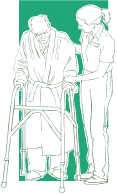 Loving carepartners
Loving carepartners
Staff members see themselves as "carepartners"
doing important work, not menial laborers changing bedpans and administering
medications. They are consistently stationed in the same areas, called
"neighborhoods" or "households," as those under their
care, so they can build meaningful relationships with them. Such relationships
not only help the elders, leading in some cases to a reduced need for
medication. They also improve job satisfaction for the staff, who learn from
residents. Thomas notes, "Elders teach us patience, tolerance,
forgiveness, compassion, unconditional love—all those things that make us
human."
 Autonomy and choice
Autonomy and choice
In some nursing homes, residents rarely make decisions for
themselves and can't set the rhythm of their daily lives. In the Eden
Alternative, elders choose when to get up, what to eat, what activities they
want to do, and when to go to bed. They may also plan meals and social events,
create traditions, and even help with the interviewing and hiring of staff.
While residents with dementia may not be capable of such broader
decision-making, they can still exercise choices that enhance their dignity.
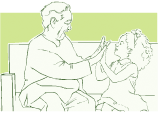 Relationships with children
Relationships with children
Children don't simply drop by to sing carols on
holidays. Instead, they are an integral part of an Eden home, forming
meaningful relationships with residents. There may be on-site day care, where
the children of staff interact with elders, as well as ties to nearby
elementary schools and summer camps. Children benefit by hearing the life
stories of older people, and they bring vitality and spontaneity into
elders' lives. Research has shown that even patients with severe dementia
become more engaged in activities when children are involved.
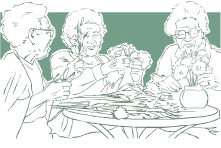 Being known well
Being known well
No one should be known as a room number or diagnosis. All
individuals—residents and staff alike—should be recognized for
their uniqueness and their part in the community. Some residents can share
their talents and mentor others. Everyone should have opportunities for growth
that draw on his or her interests and abilities. Even older people with
dementia are more likely to take on new challenges if they are known well by
those around them.
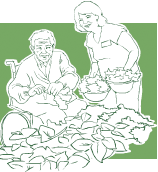 Connections with nature
Connections with nature
The Eden movement is built on the metaphor of a garden in
which all inhabitants thrive, but actual flower and vegetable gardens also play
a role in this nurturing. Tending tomato plants or tulip beds, elders have the
satisfaction of doing meaningful work and the pride of sharing the harvest.
Studies have shown that gardens comfort patients with dementia, and specially
designed "healing gardens" can even stimulate positive emotions and
memories.
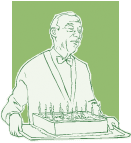 Traditions and celebrations
Traditions and celebrations
"Meaningless activity corrodes the human
spirit," says Thomas. "The opportunity to do things that we find
meaningful is essential to human health." Elders and staff join together
with family members to create their own traditions around holidays, birthdays,
anniversaries, and even simple pleasures like watching a baseball game. By
taking part in traditions and rituals, new residents and staff blend into the
social fabric of the community.
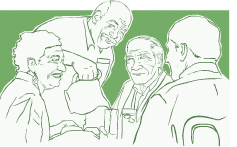 Meals with good friends
Meals with good friends
Few pleasures beat sharing good food with people we know
well. Planning and making meals are also among life's most basic
activities, yet in conventional nursing homes, older people are removed from
these rituals of daily life. In Eden homes, if they choose, residents take part
in creating meals. They also have "refrigerator
rights"—access to kitchens and foods they like at all times.
Various strategies help ensure that even socially withdrawn elders feel
comfortable joining staff and fellow residents for meals.

|



 Companion animals
Companion animals Loving carepartners
Loving carepartners Autonomy and choice
Autonomy and choice Relationships with children
Relationships with children Being known well
Being known well Connections with nature
Connections with nature Traditions and celebrations
Traditions and celebrations Meals with good friends
Meals with good friends